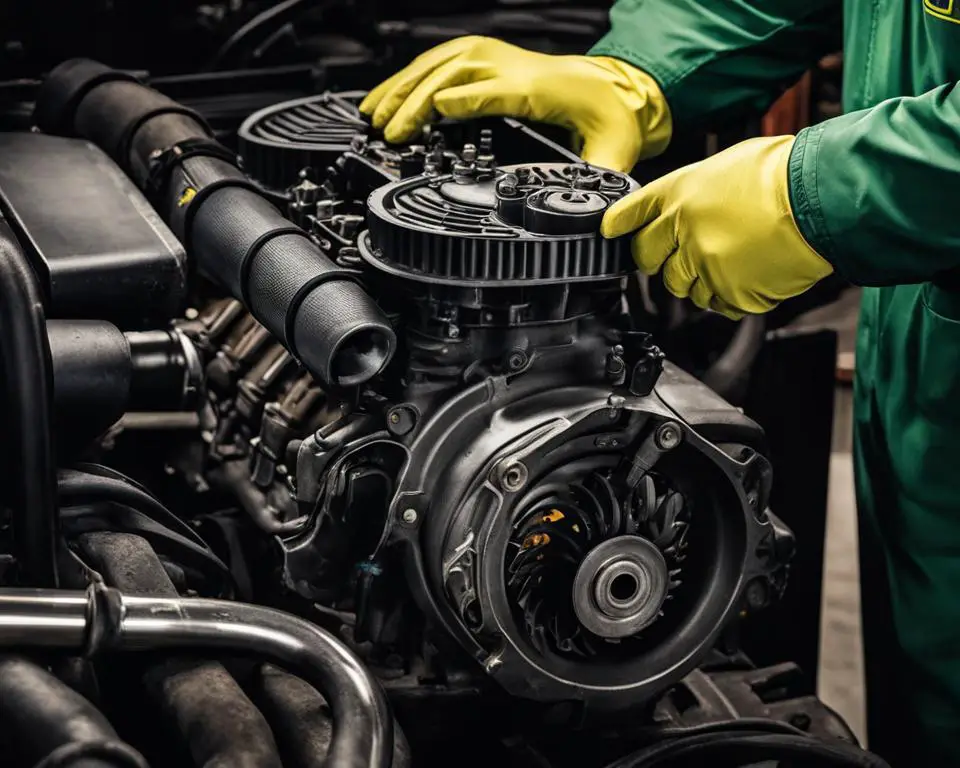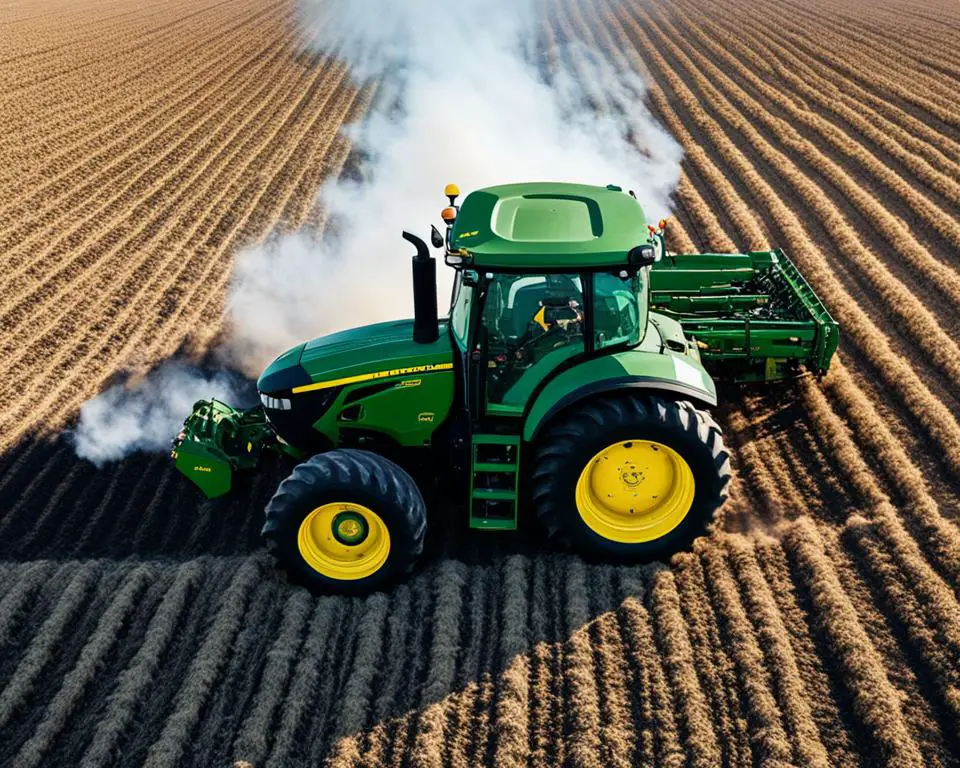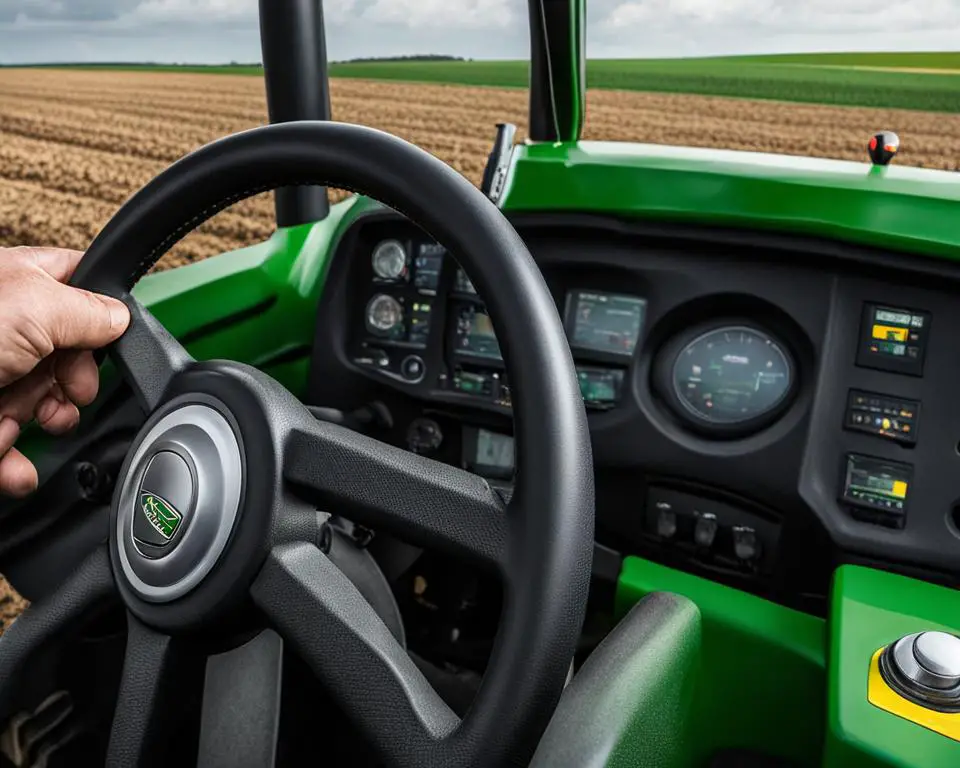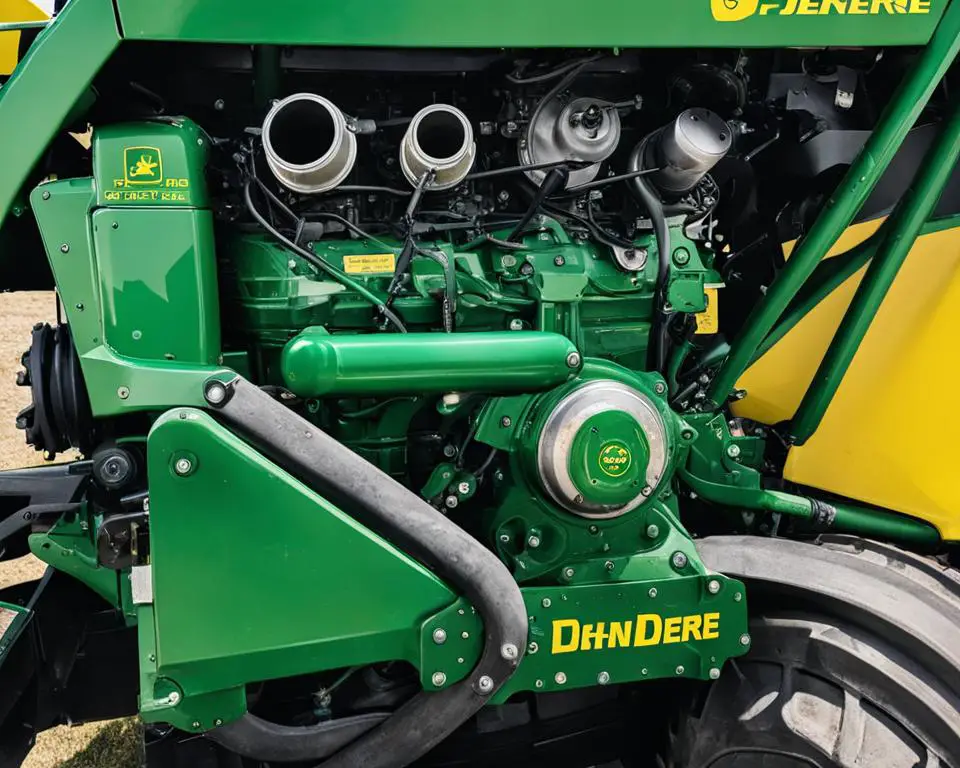In today’s fast-paced agricultural industry, it is crucial to have reliable and efficient equipment. The John Deere 2038R tractor has gained popularity among farmers and landowners for its power and versatility. However, like any complex machinery, it may encounter problems that hinder its performance and productivity. In this article, we will explore the common issues reported with the John Deere 2038R and provide insights into troubleshooting and maintenance.
If you are a proud owner of the John Deere 2038R tractor, you may have experienced some problems that require your attention. It is essential to understand these issues to effectively address them and keep your tractor in optimal working condition.
One common problem reported with the John Deere 2038R is a faulty mower deck/command cut actuator motor. This can result in uneven cutting or failure to engage the mower deck altogether, affecting the quality of your lawn or field. Another issue that owners have faced is a bent loader parking stand, which can compromise stability and safety during loader operation.
Furthermore, some users have encountered problems with the right rear wheel detachment, posing a potential safety hazard. Additionally, various failures and missing parts in the mower deck have been reported. While these issues have been covered under warranty by John Deere dealers, it is worth noting that the tractor has spent significant time in the shop for repairs.
It is important to mention that these specific problems may not be commonly reported online, making it challenging for owners to find available solutions. As an experienced tractor owner, you may be uncertain about the next steps to take. Should you continue with warranty repairs and trust that the issues will be resolved, or should you consider ordering a different unit altogether?
Throughout this article, we will delve into the common problems faced by John Deere 2038R owners and provide valuable insights into troubleshooting and maintenance. By understanding these issues and taking appropriate measures, you can ensure that your John Deere 2038R tractor remains reliable, efficient, and ready to tackle any task at hand.
Common Problems with the John Deere 2038R
When it comes to the John Deere 2038R tractor, several common issues have been reported by owners. Understanding these problems is crucial for troubleshooting and maintenance purposes. Let’s take a closer look at the most frequently encountered problems:
- Failure to start the engine: Starting issues can be frustrating, especially when you have work to do. This problem can be caused by battery issues or faulty starting solenoids. Checking the battery for a full charge and ensuring proper connections can help address this problem.
- Engine or transmission overheating: Overheating can lead to serious damage if not addressed promptly. Common causes include radiator cap leaks, clogged cooling system components, and low fluid levels. Regular inspection and maintenance of the cooling system can help prevent overheating.
- Steering difficulties: Difficulty in steering the tractor can make maneuvering a challenge. Worn steering column components, air or filter blockages in the hydraulic steering system, and low fluid levels can all contribute to steering issues. Proper inspection and maintenance of these components is essential.
- Engine stalling: A stalling engine can disrupt work and cause frustration. This problem can be caused by fuel system issues such as clogged filters or damaged injection components. Regular maintenance and fuel management are vital to prevent engine stalling.
- Low engine power: Insufficient engine power can impact the tractor’s performance. This problem can be attributed to various factors, including mechanical malfunctions and fuel system issues. Troubleshooting and addressing these issues can help restore engine power.
Addressing these common problems with the John Deere 2038R requires proper troubleshooting and maintenance. The table below summarizes the main causes and recommended solutions for each issue:
| Problem | Main Causes | Recommended Solutions |
|---|---|---|
| Failure to start the engine | Battery issues, faulty starting solenoids, loose connections | Check battery charge and connections, replace faulty starting solenoids, ensure proper connections |
| Engine or transmission overheating | Radiator cap leaks, clogged cooling system components, low fluid levels | Inspect and replace radiator cap, clean or replace clogged components, maintain proper fluid levels |
| Steering difficulties | Worn steering column components, air or filter blockages in hydraulic steering system, low fluid levels | Inspect and replace worn components, clean filters, maintain proper fluid levels |
| Engine stalling | Clogged fuel filters, damaged injection components | Regular maintenance, replace clogged filters, repair or replace damaged injection components |
| Low engine power | Mechanical malfunctions, fuel system issues | Troubleshoot mechanical components, address fuel system issues |
By addressing these common problems and following proper troubleshooting steps, owners of the John Deere 2038R can ensure optimal performance and minimize downtime associated with these issues. Stay tuned for the next section, where we will delve into troubleshooting engine start problems.
Troubleshooting Engine Start Issues
One of the common issues faced by John Deere 2038R tractor owners is difficulty in starting the engine. If you’re experiencing this problem, there are a few troubleshooting steps you can take to identify and resolve the issue.
1. Check the Battery: Start by checking the battery for a full charge and correct voltage. A weak or discharged battery may not provide enough power to start the engine. If necessary, charge or replace the battery.
2. Inspect the Starting Solenoid and Connections: A faulty starting solenoid or loose connections can prevent the engine from starting. Inspect the solenoid for any signs of damage or wear. Additionally, ensure that all connections to the solenoid and the battery are secure.
3. Address Fuel-related Concerns: Clogged filters or damaged injection components can also contribute to engine starting problems. Check and clean the fuel filters, and inspect the fuel injection system for any signs of damage or leaks. If necessary, replace the filters or repair the injection components.
By following these troubleshooting steps and regularly maintaining your John Deere 2038R tractor, you can prevent engine start issues and ensure smooth operation.

| Possible Causes | Troubleshooting Steps |
|---|---|
| Weak or discharged battery | Check battery charge and voltage. Charge or replace the battery if necessary. |
| Faulty starting solenoid | Inspect the solenoid for damage or wear. Replace if necessary. Ensure all connections are secure. |
| Loose connections | Ensure all connections to the battery and solenoid are tight and secure. |
| Clogged fuel filters | Inspect and clean the fuel filters. Replace if necessary. |
| Damage or leaks in the fuel injection system | Inspect the injection components for damage or leaks. Repair or replace as needed. |
Dealing with Engine or Transmission Overheating
Engine or transmission overheating can be a frustrating problem when operating the John Deere 2038R tractor. Several factors can contribute to this issue, including radiator cap leaks, clogged fins, insufficient cooling fluid, loose or broken drive belts, low engine oil levels, or transmission problems. To prevent overheating and maintain optimal performance, regular inspection and maintenance of the cooling system are essential.
Firstly, it is important to check the radiator cap for any signs of leaks. A faulty cap can result in a loss of pressure in the cooling system, leading to overheating. If any leaks are detected, the cap should be replaced promptly.
Clogged fins in the radiator can also impede proper airflow, causing the engine or transmission to overheat. Regular cleaning of the radiator fins with compressed air or a soft brush can help maintain efficient cooling.
Another vital aspect to consider is the cooling fluid level. Insufficient coolant can hinder the cooling system’s ability to regulate temperature effectively. Routine checks should be performed, and any low levels of coolant should be topped up as needed.
Loose or broken drive belts can negatively impact the cooling system’s performance. These belts drive the fan that helps dissipate heat from the engine or transmission. Regular inspections should be conducted to ensure the belts are in good condition and properly tensioned.
Low engine oil levels can also contribute to overheating. Inspect the engine oil regularly and add oil as necessary to maintain proper lubrication and cooling.
Lastly, transmission issues can also result in overheating. If the transmission is not operating correctly, it may generate excessive heat. Any signs of abnormal operation or shifting should be addressed promptly by a qualified technician.
By addressing these potential causes of engine or transmission overheating and performing regular maintenance, operators can ensure the John Deere 2038R tractor runs smoothly and avoids overheating issues that could lead to performance problems or even damage to vital components.

Preventive Maintenance Checklist for Cooling System:
| Component | Inspection/Maintenance |
|---|---|
| Radiator | Clean fins using compressed air or a soft brush regularly |
| Radiator Cap | Check for leaks and replace if necessary |
| Cooling Fluid | Regularly check levels and top up as needed |
| Drive Belts | Inspect for proper tension and any signs of wear or damage |
| Engine Oil | Check levels regularly and add oil as necessary |
| Transmission | Address any abnormal operation or shifting promptly |
Addressing Steering Difficulties
Steering difficulties can be a frustrating problem to encounter in the John Deere 2038R tractor. Fortunately, there are several factors that could contribute to these issues, and troubleshooting them can help you get back to smooth steering in no time.
Common Causes of Steering Problems
When experiencing steering difficulties in your John Deere 2038R, it’s important to consider the following potential causes:
- Worn shafts or links in the steering column
- Air or clogged filters in the hydraulic steering system
- Damage to the steering pump or insufficient steering fluid
- Low tire pressure
- Worn bearings
Addressing these issues promptly can prevent further damage and ensure responsive and accurate steering.
Troubleshooting Steering Issues
Here are some steps you can take to troubleshoot and resolve steering difficulties in your John Deere 2038R:
- Inspect the steering column for any signs of wear or damage. Replace any worn shafts or links as necessary.
- Check the hydraulic steering system for air or clogged filters. Bleed the system and replace filters if needed.
- Inspect the steering pump for damage and ensure that the steering fluid is at the correct level.
- Regularly check and maintain the tire pressure according to the manufacturer’s recommendations.
- Inspect the bearings for wear and replace if necessary.
By following these troubleshooting steps and addressing any issues promptly, you can ensure optimal steering performance in your John Deere 2038R.
| Common Causes of Steering Problems | Troubleshooting Steps |
|---|---|
| Worn shafts or links in the steering column | Inspect the steering column for wear and replace worn components |
| Air or clogged filters in the hydraulic steering system | Check the hydraulic system for air or clogged filters, bleed the system and replace filters if needed |
| Damage to the steering pump or insufficient steering fluid | Inspect the steering pump for damage and ensure proper steering fluid level |
| Low tire pressure | Maintain proper tire pressure as recommended by the manufacturer |
| Worn bearings | Inspect bearings for wear and replace if necessary |
By taking these steps and addressing any potential issues, you can troubleshoot and resolve steering difficulties in your John Deere 2038R, ensuring smooth and effortless steering.

Conclusion
The John Deere 2038R tractor, like any machinery, is not without its fair share of common issues. Owners have reported problems with the mower deck, loader, engine, transmission, and steering. Although these problems can be frustrating, there are effective troubleshooting and maintenance practices that can help address them.
First and foremost, it is essential to work closely with the dealer and follow the warranty coverage if necessary. John Deere has shown responsiveness and willingness to cover these issues under warranty. Seeking assistance from authorized dealers ensures that the problems are addressed by experts who have in-depth knowledge of the tractor’s workings.
Furthermore, regular inspection and maintenance of the tractor are crucial in preventing future problems. Conducting routine checks of the mower deck, loader, engine, transmission, and steering system can help identify any potential issues early on. This proactive approach allows owners to take corrective measures promptly and avoid more significant problems down the line.
In conclusion, while the John Deere 2038R may experience common problems, it is important to remember that proper troubleshooting and maintenance can alleviate these issues. By working closely with the dealer and practicing regular inspections and maintenance, owners can ensure their tractors operate smoothly and efficiently.
FAQ
What are some common problems with the John Deere 2038R tractor?
The most common problems reported with the John Deere 2038R include failure to start the engine, engine or transmission overheating, steering difficulties, engine stalling, and low engine power.
What can cause the engine of the John Deere 2038R to not start?
If the John Deere 2038R tractor is difficult to start, it is recommended to check the battery for full charge and correct voltage. Other possible causes include a faulty starting solenoid or loose connections, clogged filters, or damaged injection components in the fuel system. Regular maintenance and fuel management can help prevent engine start problems.
How can I prevent engine or transmission overheating in the John Deere 2038R?
Engine or transmission overheating can be prevented by regular inspection of the cooling system, including cleaning or replacement of clogged components, and proper maintenance of fluid levels. Factors such as radiator cap leaks, clogged fins, insufficient cooling fluid, loose or broken drive belts, low engine oil levels, or transmission issues can contribute to overheating.
What should I do if I experience steering difficulties with my John Deere 2038R?
If you experience steering difficulties with your John Deere 2038R, it is recommended to inspect and address components such as worn shafts or links in the steering column, air or clogged filters in the hydraulic steering system, damaged steering pump or insufficient steering fluid, low tire pressure, or worn bearings. Proper inspection of these components and maintenance of fluid levels can help resolve steering issues.
How should I deal with common issues on my John Deere 2038R tractor?
While the John Deere 2038R may experience common problems with the mower deck, loader, engine, transmission, and steering, it is important to work with the dealer and follow the warranty coverage if necessary. Regular inspection and maintenance of the tractor can help prevent future problems.

Leave a Reply